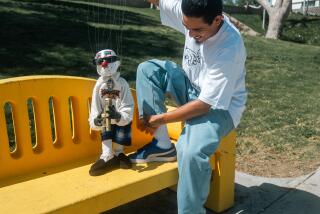Burr Tillstrom, the gentle genius who created...
Burr Tillstrom, the gentle genius who created a puppet show called “Kukla, Fran and Ollie,” died in December in Palm Springs as quietly as he had lived.
For those of us who were nurtured on “Kukla, Fran and Ollie,” which started on Chicago television, Tillstrom’s death had special meaning.
Although the show later appeared sporadically on network TV, Tillstrom never again achieved the joyous continuity and intimacy that enriched the lives of all of us who watched “Kukla, Fran and Ollie” daily throughout the 1950s and early ‘60s.
Kukla is a clown, Ollie is a dragon (I use “is” because these characters have a life that transcends Burr Tillstrom, which was one of his gifts to us), and Fran is a very live person--a gracious foil for the puppets she clearly considered peers and dealt with that way. From Chicago, Fran Allison was quoted after Tillstrom’s death as saying: “We never had a script. It was just one of those very perfect things that once in awhile work out.” Indeed it was.
I carried Tillstrom’s obituary--printed modestly in The Times--stuffed in my pocket for several weeks, puzzling about why this show had such an impact on me.
It was only when watching a “kids’ movie” with a very young companion that my thoughts coalesced. My small friend said he liked the movie, but he sat through it stoically as did the other children in the audience. The film, which will go unnamed, lacks any semblance of wonder, grace, style, curiosity, subtlety, humor or joy. Special effects have replaced style and substance, and we’re all the losers for it.
The film reputedly cost $40 million to make, which seems to be a measure of quality these days. What it didn’t have are precisely the qualities Burr Tillstrom expressed daily in his work--including the ability, so seldom seen today, to appeal to viewers at several quite different levels at the same time. This has always been the mark of great artists, and it seems almost lost. The mindless fare that now passes for kids’ entertainment--mostly exploiting violence and vaguely moral fables in outer space--offers the thinking adult nothing but boredom and finally irritation.
Tillstrom’s Kuklapolitan Players ranged from the gentle, thoughtful Kukla to the boastful, arrogant Ollie, with a cast of characters in between that caught virtually every human foible. But if these characters were often vain and selfish, they were also complex. Kukla could be occasionally petulant, Ollie could be kind and wistful, and even the stuffy, pompous Madame Oglepuss could be compassionate. There were no Good Guys and Bad Guys, and children were at least introduced to the possibility that the world is made up not of clearly delineated blacks and whites but rather many complex shades of gray. And that people do the best they can with what they have.
If this was indeed the intent of “Kukla, Fran and Ollie,” it grew out of the personality of Burr Tillstrom and was never presented self-consciously. His characters were fully developed, and they reacted--sometimes quite unexpectedly--to situations and ideas. Tillstrom and Allison went into each show with a small thesis, a germ of an idea, that would be thrown out at the beginning. And then the characters simply took it from there. Allison never knew who was going to pop up in Tillstrom’s hands, and her surprise was genuine. The talk was funny, usually gentle, always subtle.
People my age constantly have to resist the impulse to say “they don’t make ‘em like that anymore.” But in Tillstrom’s case, I say it without fear of challenge. I have no idea what people today would make of him. I suspect they would be impatient. Tillstrom’s pace was leisurely and his approach mostly conversational. There were no seltzer bottles or pies in the face, and frequently not very much happened. Viewers had to stay with the show for awhile--at least long enough to get acquainted with the characters--before the full impact of Tillstrom’s genius could sink in. There was no instant gratification here.
But there was grace. More than any other quality, Tillstrom’s work was graceful--and if any single element is almost totally missing from today’s hyped-up, bumpersticker, high-pressure, over-simplified, in-a-hurry, computerized society, it is grace. Thank you, Burr Tillstrom, wherever you are, for giving meaning and substance to that word for me and my children.
More to Read
Only good movies
Get the Indie Focus newsletter, Mark Olsen's weekly guide to the world of cinema.
You may occasionally receive promotional content from the Los Angeles Times.








